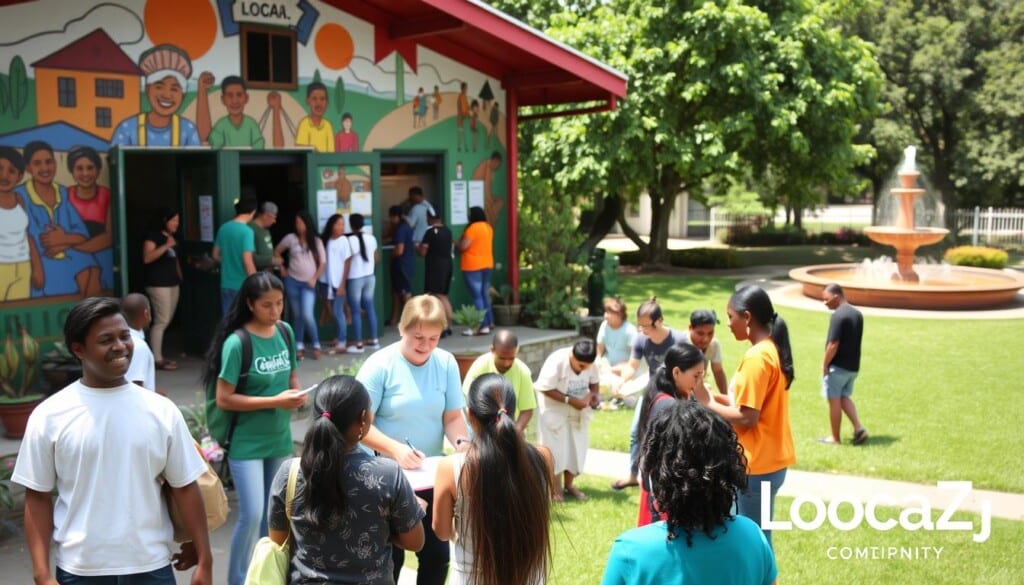Is the rise of homelessness in America really misunderstood? This guide aims to shed light on the issue. It explores the different Homeless Shelters & Housing Assistance that help across the country. By looking into these options, we can better tackle homelessness together.
Local efforts and programs are key in supporting those without homes. They offer hope for a brighter future. This guide is here to help you understand and get involved in these efforts.
Key Takeaways
- Understanding the complexity of homelessness helps inform better assistance strategies.
- Different types of homeless shelters cater to varying needs, from emergency response to permanent solutions.
- Community collaboration is essential in addressing the issue and enriching available resources.
- Accessible information on housing assistance programs can empower individuals seeking help.
- Involvement with local initiatives fosters a supportive network for those experiencing homelessness.
Understanding Homelessness in America
Homelessness in America is a big problem with many challenges. We need to look at the numbers to understand how big it is. We also need to know what causes it, like money problems and housing issues.
The COVID-19 pandemic made things worse. It changed how we help people who don’t have homes.
Key Statistics on Homelessness
About 580,000 people don’t have homes in America on any given night. This number changes depending on where you are. Cities tend to have more people without homes because of high costs and crowded spaces.
Homelessness affects many groups, like families, veterans, and people who are often overlooked. It’s a big problem with many faces.
Factors Contributing to Homelessness
Many things lead to homelessness. Money problems, like losing a job or not making enough, are a big one. There’s also not enough affordable housing, so many are just one paycheck away from being kicked out.
Health issues, like mental health problems or addiction, can also push people into homelessness. It’s a cycle that’s hard to break.
The Impact of COVID-19 on Homelessness
The COVID-19 pandemic made homelessness worse in the United States. It forced many into bad living situations because shelters closed and it was hard to get help. Governments tried to help by stopping evictions and giving more money to shelters.
But, it’s not easy to solve this problem. The country is working hard to find ways to help those without homes.
Types of Homeless Shelters Available
There are many types of homeless shelters, each meeting different needs. It’s important to know about them to understand the support available for those in need.
Emergency Shelters
Emergency shelters offer quick, short-term help for those without homes. They provide a safe place to stay while people figure out their next steps. These shelters are often open to anyone who needs help and offer connections to resources.
Transitional Housing
Transitional housing helps people move from homelessness to permanent homes. It offers support services to help residents learn to live independently. These programs have a time limit, encouraging people to work towards a stable future.
Permanen Supportive Housing
Permanen supportive housing provides a stable home for those with chronic homelessness. It offers affordable housing and ongoing services like case management and health care. This helps residents become more independent and reduces the risk of homelessness.
Finding Local Homeless Shelters
Finding local homeless shelters is easier with the right tools. Online directories like LocalZ make it simple to find help in your area. They help you search for shelters and services close to you.
Utilizing Online Directories
Online directories are key in finding shelters. They let you search by location and needs. LocalZ makes it easy to find shelters and services in your community.
Importance of Community Resources
Community resources are vital for those without homes. They offer more than just shelter, like food, health care, and social services. Working with local groups ensures people get the help they need, improving their lives.
Collaborations with Local Governments
Working with local governments helps shelters a lot. Shelters and governments team up for better funding and services. This partnership helps make sure people get the support they need to find a stable home.

Housing Assistance Programs Explained
Housing assistance programs help low-income people and families in the U.S. They offer both federal and state help, tailored to each community’s needs. Knowing about these programs is key for those looking for housing aid. It helps them find stable housing more effectively.
Federal Programs Overview
Federal housing programs support those who qualify. The U.S. Department of Housing and Urban Development (HUD) runs many programs. For example, the Housing Choice Voucher Program lets people choose their housing in the private market.
This program aims to make housing more affordable and stable. Other programs help veterans or people with disabilities.
State-Specific Assistance Options
Each state has its own housing help. These programs meet local needs and use local resources. Many states offer rental assistance, helping with deposits or temporary housing.
It’s important to find the right state program for your situation. This ensures you get the best help available.
How to Apply for Housing Assistance
Applying for housing aid needs preparation and knowledge. You’ll need to gather documents like income proof and ID. Knowing what you qualify for makes applying easier.
Local housing authorities can help with the application. They offer advice and improve your chances of getting aid.
Homeless Shelters & Housing Assistance
Homeless shelters offer many important services to help people in need. They have food programs, mental health resources, and job training. These services aim to help people become stable and independent.
Food and Nutrition Programs
Shelters make sure everyone gets nutritious meals. They have food programs that give balanced diets. This helps with hunger and keeps people healthy in the long run.
They also teach about nutrition. This is a big step towards better health for everyone.
Mental Health Resources
Shelters know mental health is key to recovery. They offer counseling and support groups. These help people deal with mental challenges.
They give the tools needed to handle tough situations.
Job Training and Employment Services
Shelters also help with job skills and finding work. They offer job training and employment services. This helps people get better jobs and succeed long-term.
LocalZ and Community Engagement
LocalZ is key in building community ties by backing local businesses and boosting connections with residents. It helps businesses reach out to local customers and support community projects. LocalZ aims to grow the local economy by linking different community members together.
How LocalZ Supports Local Businesses
LocalZ gives local businesses a vital platform to get noticed and connect with nearby customers. It’s an online directory where businesses can highlight their services, drawing in more clients. This boosts the local economy by making local services and products more accessible.
Each business listing also helps fund community projects. This way, LocalZ supports initiatives that help the community.
Giving Back to the Community
LocalZ is committed to helping the communities it serves. A part of the listing fees goes to support community projects, like helping the homeless and those in need. This effort brings local businesses and residents together, encouraging them to support each other for the greater good.
Partnering with Nonprofit Organizations
LocalZ teams up with nonprofits to make a bigger difference in community welfare. Working with groups focused on homelessness, LocalZ delivers vital support to those in need. These partnerships also highlight local nonprofits and encourage community involvement, making essential services more accessible.

Navigating the Application Process
The application process for housing assistance can seem overwhelming. It’s important to have all the right housing documents ready. Knowing the steps can really help you succeed.
Preparing Necessary Documentation
Getting the right housing documents is key. You’ll need financial records, ID, proof of where you live, and any proof you need help. This makes your application smooth and answers common questions from agencies.
Tips for a Successful Application
Success comes from being detailed and prepared. Always read the guidelines, fill out forms carefully, and meet deadlines. Getting help from local resources can also improve your application. A well-organized application shows you’re serious and committed.
Common Challenges and Solutions
Many people struggle with missing documents or not knowing if they qualify. To overcome these, talk clearly with the assistance programs. Keep a list of needed documents and ask for help early. This can avoid delays and boost your chances of success.
Evaluating Shelter and Assistance Programs
When looking at shelters and help programs, knowing what to look for is key. You need to check the services, living conditions, and the vibe. Each shelter is different, so picking the right one is important.
Look for cleanliness, basic needs, and caring staff in a shelter. It’s also important to know about visitor rules, meals, and support services. A good shelter helps people recover and feel stable.
Checking a housing program’s quality means looking at support systems like case management. A good program helps with immediate needs and offers ways to find stability. This includes jobs and mental health services.
Reading what others say about shelters can help a lot. Their stories show what’s good and what’s not. Positive feedback often talks about caring staff and effective programs. This helps people choose the best shelter for them.
Resources for Further Support
Finding the right support is key for those facing homelessness. Many resources are available, from national groups to local nonprofits and online forums. These offer help, connection, and access to important services.
National Organizations to Know
Many national groups tackle homelessness head-on. The National Alliance to End Homelessness and the U.S. Interagency Council on Homelessness are examples. They provide resources, advocate for policies, and share best practices to fight homelessness nationwide.
Local Organizations and Nonprofits
Local nonprofits are vital for community support. They offer food, housing help, and job training. By connecting with local groups, people can get tailored assistance and find lasting solutions.
Online Support Groups and Forums
Online forums are great for connecting. They let people share their stories and get advice from others who get it. These groups offer emotional support and practical tips to face challenges.

Success Stories from Homeless Shelters
Real-life stories show how shelters and support programs change lives. These stories tell of people moving into stable homes. They show how community help is key to this change.
Inspirational Testimonials
People share their amazing journeys in shelters. They thank the resources that helped them find stability. Their stories of strength and hope show how support can change lives.
Case Studies of Transition to Permanent Housing
Case studies show how people move to permanent homes. They highlight the power of tailored support. With help, many find stable homes and gain independence.
The Role of Community Support in Success
Community support is essential for success in shelters. Local groups, shelters, and businesses work together. This teamwork can change lives, helping people move to permanent homes with confidence.
Staying Informed About Local Initiatives
Getting involved in local initiatives is key to helping our communities, like tackling homelessness. Knowing about programs and outreach helps us contribute to our neighborhoods. There are many ways to help, like volunteering or going to events.
How to Get Involved in Your Community
There are many ways to help out. You could volunteer at shelters or help with food drives. Working with local groups strengthens our community and raises awareness about homelessness. Every little bit helps those in need.
Upcoming Events and Fundraisers
Our communities often hold events to raise money and awareness for homelessness. Going to these fundraisers is a great way to meet others who care. It helps fund important programs for those without homes.
Educational Workshops and Resources
Learning about homelessness is important. Local groups offer workshops to teach us about it. These workshops help us understand and support those in need in our communities.
Contacting Local Assistance Services
Getting help from local services is key for those in need. Knowing how to reach out quickly can make a big difference. Many groups offer different ways to get in touch, like phone numbers and online forms.
How to Reach Out for Help
Starting to get help often means calling toll-free numbers or hotlines that are always open. You can also use online forms or email to ask for help. If you want to help others, check out the LocalZ community registration page to get involved.
Lines of Communication for Immediate Assistance
Emergency services and hotlines are vital for quick help. They connect you fast with local shelters and programs. Keep these numbers handy for when you need them most.
Creating a Network of Support
Building a support network can really help. Connect with friends, family, and local groups to share info on help. This way, everyone works together to face challenges. Strong relationships in these networks can lead to lasting support.

